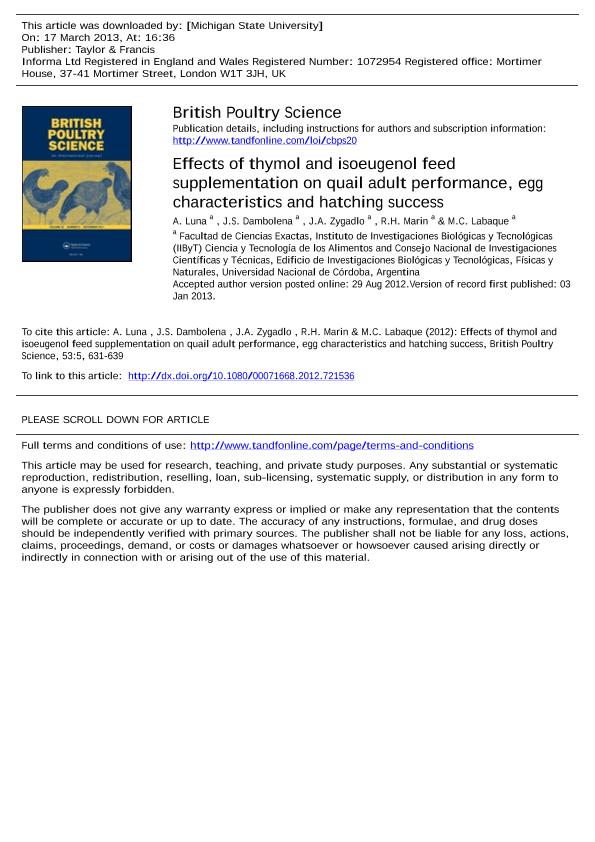Mostrar el registro sencillo del ítem
dc.contributor.author
Luna, Agustin

dc.contributor.author
Dambolena, Jose Sebastian

dc.contributor.author
Zygadlo, Julio Alberto

dc.contributor.author
Marin, Raul Hector

dc.contributor.author
Lábaque, María Carla

dc.date.available
2017-06-26T14:48:01Z
dc.date.issued
2012-10
dc.identifier.citation
Luna, Agustin; Dambolena, Jose Sebastian; Zygadlo, Julio Alberto; Marin, Raul Hector; Lábaque, María Carla; Effects of thymol and isoeugenol feed supplementation on quail adult performance, egg characteristics and hatchling success; Taylor & Francis Ltd; British Poultry Science; 53; 5; 10-2012; 631-639
dc.identifier.issn
0007-1668
dc.identifier.uri
http://hdl.handle.net/11336/18852
dc.description.abstract
1. A study was conducted to evaluate whether feed supplementation with thymol or isoeugenol can alter Japanese quail growth rate and final body weight, the female onset of puberty, henday egg production and the physical and chemical characteristics of the egg, as well as its potential to alter hatchability. 2. From 4 to 16 weeks of age, birds from each cage (1 male: 3 females) were assigned to 1 of 3 treatments that differed in the supplement added to the feed: control, thymol or isoeugenol (400 mg/kg). The average ages (d) at first egg lay (FIRST), at 25% egg production (A25% EP), at 50% egg production (A50% EP) and weekly and cumulative hen-day egg production (HDEP) were calculated. In addition, physical and chemical characteristics of the eggs, their fertility and hatchability were also evaluated for each group. 3. Feed supplementation did not significantly affect growth rate, final body weight, egg production parameters, fertility and physical characteristics of egg or most of the fatty acid components of the yolk. 4. The group treated with isoeugenol showed an increase in the percentage of palmitoleic fatty acidcompared to the control, with thymol group showing intermediates values. 5. Both thymol and isoeugenol supplemented groups showed increased hatchabilities, by 188% and 118%, respectively, compared to their control counterparts. 6. The improvement in the hatching success of the eggs from the thymol and isoeugenol supplemented groups without a negative impact on their performance may have important economic implications for future breeding programmes, particularly if these effects generalise from quail to other more commercially important poultry species, such as chickens or turkeys.
dc.format
application/pdf
dc.language.iso
eng
dc.publisher
Taylor & Francis Ltd

dc.rights
info:eu-repo/semantics/openAccess
dc.rights.uri
https://creativecommons.org/licenses/by-nc-sa/2.5/ar/
dc.subject
Dietary Supplementation
dc.subject
Japanese Quail
dc.subject
Thymol
dc.subject
Isoeugenol
dc.subject
Egg`S Hatchability
dc.subject.classification
Otras Ciencias Biológicas

dc.subject.classification
Ciencias Biológicas

dc.subject.classification
CIENCIAS NATURALES Y EXACTAS

dc.title
Effects of thymol and isoeugenol feed supplementation on quail adult performance, egg characteristics and hatchling success
dc.type
info:eu-repo/semantics/article
dc.type
info:ar-repo/semantics/artículo
dc.type
info:eu-repo/semantics/publishedVersion
dc.date.updated
2017-06-16T15:52:48Z
dc.identifier.eissn
1466-1799
dc.journal.volume
53
dc.journal.number
5
dc.journal.pagination
631-639
dc.journal.pais
Reino Unido

dc.journal.ciudad
Londres
dc.description.fil
Fil: Luna, Agustin. Consejo Nacional de Investigaciones Científicas y Técnicas. Centro Científico Tecnológico Conicet - Córdoba. Instituto de Investigaciones Biológicas y Tecnológicas. Universidad Nacional de Córdoba. Facultad de Ciencias Exactas, Físicas y Naturales. Instituto de Investigaciones Biológicas y Tecnológicas; Argentina
dc.description.fil
Fil: Dambolena, Jose Sebastian. Consejo Nacional de Investigaciones Científicas y Técnicas. Centro Científico Tecnológico Conicet - Córdoba. Instituto Multidisciplinario de Biología Vegetal. Universidad Nacional de Córdoba. Facultad de Ciencias Exactas Físicas y Naturales. Instituto Multidisciplinario de Biología Vegetal; Argentina
dc.description.fil
Fil: Zygadlo, Julio Alberto. Consejo Nacional de Investigaciones Científicas y Técnicas. Centro Científico Tecnológico Conicet - Córdoba. Instituto de Investigaciones Biológicas y Tecnológicas. Universidad Nacional de Córdoba. Facultad de Ciencias Exactas, Físicas y Naturales. Instituto de Investigaciones Biológicas y Tecnológicas; Argentina
dc.description.fil
Fil: Marin, Raul Hector. Consejo Nacional de Investigaciones Científicas y Técnicas. Centro Científico Tecnológico Conicet - Córdoba. Instituto de Investigaciones Biológicas y Tecnológicas. Universidad Nacional de Córdoba. Facultad de Ciencias Exactas, Físicas y Naturales. Instituto de Investigaciones Biológicas y Tecnológicas; Argentina
dc.description.fil
Fil: Lábaque, María Carla. Consejo Nacional de Investigaciones Científicas y Técnicas. Centro Científico Tecnológico Conicet - Córdoba. Instituto de Investigaciones Biológicas y Tecnológicas. Universidad Nacional de Córdoba. Facultad de Ciencias Exactas, Físicas y Naturales. Instituto de Investigaciones Biológicas y Tecnológicas; Argentina
dc.journal.title
British Poultry Science

dc.relation.alternativeid
info:eu-repo/semantics/altIdentifier/url/http://www.tandfonline.com/doi/abs/10.1080/00071668.2012.721536
dc.relation.alternativeid
info:eu-repo/semantics/altIdentifier/doi/http://dx.doi.org/10.1080/00071668.2012.721536
Archivos asociados
